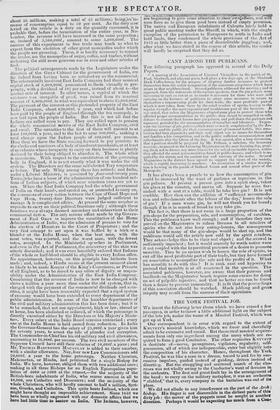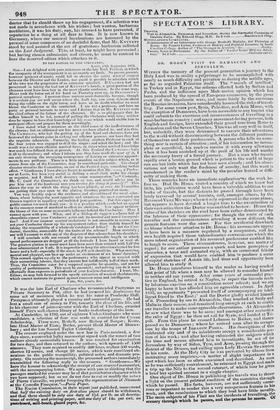THE YORK FESTIVAL JOB.
WE insert the following letter (from which we have erased a few passages), in order to throw a little additional light on the subject of the late job, under the name of a Musical Festival, which was got up at York.
Our correspondent is in error with regard to the extent of KNYVETT'S musical knowledge, which we know and cheerfully admit to be extensive and sound. But theoretical musical acquire- ments form only one ingredient among the many which are re- quired to form a good Conductor. The other requisites KervvErr is destitute of—nerve, promptness, vigilance, regularity, self- possession, all of which are indispensable, enter but slightly into the composition of his character. Hence, throughout the York Festival, lie was like a man in a dream, tossed to and fro by suc- cessive impulses, guided instead of guiding, driven instead of directing. But the straggling and scattered march of the cho- ruses was not wholly owing to the Conductor's want of decision in the orchestra. The first and great fault lay in the arrangement of the band : to carry on the military metaphor, it was an orchestra " clubbed," that is, every company in the battalion was out of its place. We did not allude to any interference on the part of the Arch I bishop. His finger is not discernible in the dirtiest parts of this dirty job : the mover of the puppets must be sought in another direction. Perhaps it would be expecting too much from a Com!
•
ductor that he should throw up his engagement, if a selection was not made in accordance with his wishes ; but wanton, barbarous mutilation, it was his duty, nay, his interest to have prevented, if reputation be a thing at all dear to him. It is now known in Germany, where our musical lucubrations are honoured by the perusal of some composers of no doubtful fame, that Mr. KNvvarr stood by and assisted at the act of gratuitous barbarism inflicted on the Lust Judgment. This, at least, he might have prevented ; but having chosen submission and silence, he must be content to bear the deserved odium which attaches to it.
TO TUE EDITOR TILE SPECTATOR.
Leeds, 18th September 18.'15.
am delighted with your strictures on the late York Festival, in which the incapacity of the management is so accurately set forth. No person present, however ignorant of music, could fail to observe the entire want of concert between the Director sod the Leader, nor could it possibly he mistaken which of the two was the perpetrator of so extensive mischief. If CRAMER had not persevered in taking the lead out of It: N vETT's hands, a great portion of the choruses must have been lost in the most chaotic confusion. In the same way, Moat took the baton out of his hand on Thursday even•ng, in ItErritovrar's pastoral symphony. I mention these matters most distinctly, because, though it is evident you are well aware where the fault lay, you seem delicate about fixing the saddle on the right horse, and leave us in doubt whether we must blame the Conductor or the conducted. I am not a professor, and have no party or personal interests to serve : and I declare that on Mr. KNVVETT rests the chief odium of the failure of thu choruses. Ile is so phlegmatic that he suffers himself to be led, instead of pulling the Orchestra with bins; neither does tie appear to have that knowledge of his scup e which would enable him to anticipate effects and prepare for them accordingly. - I have stated what is notorious as the chief cause of the ineffectiveness of the chorus; but an additional one has never yet been alluded to, and it is this. The CA MIDGES, who had the getting sip of the band and choruses, have not bestowed the ordinary pains in seeking out efficient persona, nor have they had the requisite rehearsals. Formerly, the leading resident Professor in each of the four towns was engaged to drill the singers and select the best ; and the result was a far more efficient musical force, in times when musical knowledge was much less diffused than at present. At this Festival the Ca MI JIG Es have it all to themselves ; and when I inform you they hare made the most of' it, I am only showing the unvarying consequence of leaving so extensive appoint- ments to one professor. There is a little anecdote on this subject which, as it comes from one of the Committee, may he considered authentic. The choral director stated to the Committee, on one of the Festival dap, something to this effect. " Gentlemen, I have always forgot to mention that Mr. —, a Profes- sor at Leeds, has been very useful in drilling a small choir under his charge as organist, and I think well deserves some remuneration."—" Certainly, Mr. C. (said the Committee), we think so too, and would advise you to pay him out of the handsome sum you receive fin- doing it yourself !" This shows the way in which the thing has hens jobbed ; as eren the Committee are getting their eyes open to the glaring humbug practised on them.
You very forcibly expase the crudeness and absurdities of the vocal selec- tions, where feelings the most opposite and situations the most contrasted are
thrown together in appalling and stultified juxtaposition. For this expmer the public cannot too muds thank you : it is a practice which reeds but an appeal to the common sense of mankind to effect its abolition. Yam, appear to throw the blame of this on some aristocratic influence behind the Conductor. Here I cannot agree with you. What, and if a Bishop do suggest a scheme full of absurdities cannot your Conductor point out its musical and moral incongrui- ties? And if our amateur musical ecclesiastic is not amenable to reason, can- not your Conductor throw up his engagement rather than stultify himself by taking the responsibility of a wholesale catalogue of follies? Is not the Con- ductor, therefore, answerable for the faults of the scheme? Most certainly ; nor will I consent to shift any of the disgrace of that scheme from his shoulders.
I will conclude with one remark on the unconscionable length to which sacred performances are dragged at all the festivals I have beard or read of. The greatest glutton in music must have been more than satiated with half the dose administered at York. It is impossible to keep the attention rivetted for five hours and a half—especially if the music be tilt as it should be. What stamina, mental and physical, can bear up under an excitement of six hours' duration? This remark applies equally to the performers; who appear so wearied with their unremitting labours, that they execute but indifferently half of their work. Thus, the Committee cater for a supposed appetite for quantity, and not for quality of performances. This must be amended; and nothing can do it more effectually than exposure in periodicals of your fearless character. I trust, Mr. Editor, we may look forward to the speedy extinction of musical charlatanerie, which cannot maintain its ground against commotion sense and intelligence.



























 Previous page
Previous page